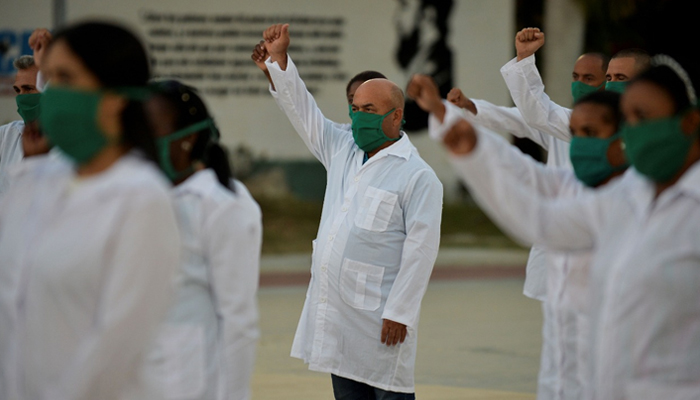'Shortage of PPEs risks health of doctors, patients' during COVID-19 crisis, says medic
Doctors says aggressive testing is needed in Pakistan to curb the spread of coronavirus
KARACHI: Sindh Young Doctors Association (YDA Sindh) Chairperson Dr Umer Sultan on Sunday stressed on the need for medics to be equipped with protective gear to ensure their own as well as their patients' safety.
"Last night, a patient was transferred from a private hospital to our emergency facility, he died last night and was diagnosed with coronavirus today, he said.
"The doctors who treated him are now in quarantine for 14 days including the paramedical staff. Who is going to replace them?” asked Sultan, who is also a consultant physician at the Jinnah Post Graduate Medical Center (JPMC).
The young doctor appealed to the government to provide personal protective equipment (PPEs) to all doctors serving during the pandemic since they were exposed to potential patients on a daily basis. "Save doctors to save patients," he urged.
Sultan also spoke of Italy, where conditions in the start were eerily similar to those in Pakistan and have remained so even after a month has passed since the first patient tested positive. There, "the death rate is increasing drastically because more than 1,500 of their doctors are in quarantine, they are reserved to their houses with no replacement”, he said.
“If such things start here, then we will face a crisis greater than Italy as Pakistan does not have enough ventilators and other facilities to fight coronavirus.”
Referring to the risk medical staffers pose to others, he said: "If doctors — the ones who are infected — are not wearing PPEs, they will end up infecting either the patients they treat or their family members.”
"Recently, the daughter and father-in-law of a colleague were diagnosed with coronavirus; she was young and did not show symptoms [at all]. So doctors are also a real risk,” he said.
Sultan explained that any doctor in an emergency ward, as well as general physicians, treat nearly 50 patients a day, while the number is little lower when it comes to surgeons and consultants, which effectively means that there are 50 chances for any of the aforementioned healthcare professionals to be infected.
Praising the medical fraternity, Sultan said house officers and post-graduate doctors were working 30-hour shifts every four to five days and that they were trying their best to tackle the pandemic. "We are working extra hours as well and we appeal to the chief minister to provide us with a health risk allowance like his Punjab counterpart did recently,” he said.
The YDA Sindh official requested the provincial government to immediately distribute the 200,000 PPEs they recently received.
‘Lockdown helped bring down the number of cases’
“In America and Italy, cases were diagnosed in January whereas the first person to test positive in Pakistan was in February. Now, nearly 500 people are dying every day in these countries and we need a complete lockdown to avoid a situation like that,” he added, expressing concern that the nation was not at all equipped if the outbreak worsened.
The screening and testing capacity should also be increased, he said, noting that at least a million people needed to be tested in Karachi to ascertain the ground realities. "Testing kits should be provided to hospitals immediately,” he said.
“We praise the Sindh government for its proactive role since day one and I urge people to follow the advice of doctors and the government,” he stated.
"The lockdown has indeed helped to bring the count down because people are indoors. However, this isn’t enough.
"When we're testing enough people and then if we see a decline in the numbers, we can say 'yes, we are moving towards progress',” he noted. "For example, a person who died yesterday was diagnosed with COVID-19. Now, the people who bathed him and those that buried were all very likely exposed to the disease.
"If our testing capacity was more than it is at present, there was a chance that he could have been diagnosed earlier,” he said, adding that the government "should extend the lockdown as the situation will be clearer by April 15,” he said.
Sultan also urged for a Sindh Infectious Diseases Hospital to be set up, with at least 1,000 beds, to better tackle coronavirus, as well as any other diseases that the country may face in the future.
The number of confirmed COVID-19 cases in Pakistan rose to 1,568 on Sunday after new cases were reported across the country, while a total of 15 deaths have been reported so far.
More than 30,000 deaths have been recorded globally, of which most have been in Europe since the virus first emerged in December.
Over 662,000 virus cases have been registered in 200 countries and territories of which the majority have been in Europe, the worst-hit continent.
-
Security forces gun down 30 terrorists in multiple IBOs in KP: ISPR
-
MQM-P calls for new province in Sindh
-
US report validates Pakistan military edge over India: PM
-
Banned TTP poses serious threat to Pakistan security: UNSC panel
-
CM Afridi clarifies remarks on by-poll after ECP requests army deployment
-
Dubai sees 3.2m Pakistani passengers in 2025 as airport sets new milestone
-
Security forces kill 23 Indian proxy terrorists in KP's Kurram
-
Pakistan to construct island to boost oil exploration: report












